七年级英语上Unit4 Jobs people do教学设计(牛津上海版)
牛津上海版七年级英语上册教学设计:Unit4Jobspeopledo
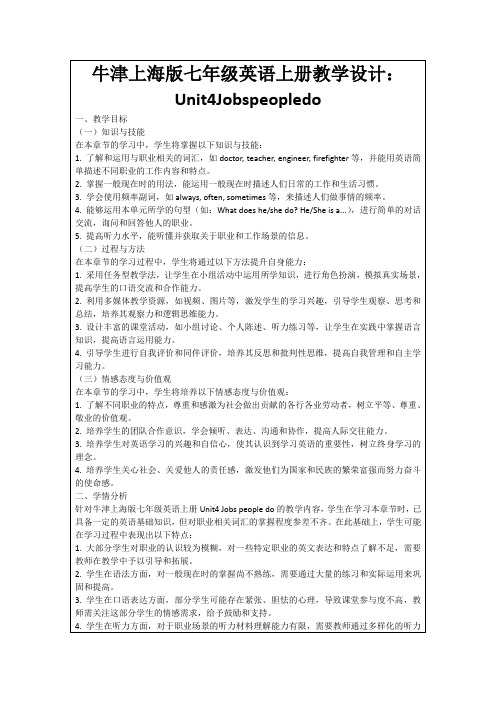
3.教师引导学生学习频率副词always, often, sometimes等,并在句子中进行实际运用,加深学生的理解。
4.教师讲解本单元的句型:“What does he/she do? He/She is a...”,并组织学生进行模拟对话,巩固所学知识。
1.大部分学生对职业的认识较为模糊,对一些特定职业的英文表达和特点了解不足,需要教师在教学中予以引导和拓展。
2.学生在语法方面,对一般现在时的掌握尚不熟练,需要通过大量的练习和实际运用来巩固和提高。
3.学生在口语表达方面,部分学生可能存在紧张、胆怯的心理,导致课堂参与度不高,教师需关注这部分学生的情感需求,给予鼓励和支持。
3.整合多媒体资源,如视频、图片等,丰富教学内容,激发学生的学习兴趣。同时,通过多媒体展示,让学生更直观地了解各种职业的工作场景。
4.设计分层作业,针对不同层次的学生,布置难易适度的作业,使每个学生都能在课后巩固所学知识,提高学习效果。
5.课后拓展活动:鼓励学生参加学校组织的职业体验活动,实地了解各种职业,将所学知识与社会实践相结合。
(三)学生小组讨论
1.教师将学生分成小组,每组选择一个职业进行讨论,探讨该职业的工作内容、工作环境、需要的技能等。
2.各小组用英语进行讨论,鼓励学生积极参与,提高口语表达能力。
3.讨论结束后,各小组向全班汇报讨论成果,教师进行点评和指导。
(四)课堂练习
1.教师设计一系列课堂练习,如填空、选择、连线等,让学生运用本节课所学知识,巩固职业词汇和一般现在时的用法。
6.教学评价:采用多元化的评价方式,包括课堂表现、作业完成情况、听力测试、口语表达等,全面评估学生的学习效果。
牛津上海版英语七年级上Unit4 Jobs people do教案

牛津上海版英语七年级上Unit 1 Jobs people do一、单元分析(Unit Analysis)(一)单元地位(Unit Position)1 本课中出现了较多的用(一般现在时)第三人称单数来表示、描述不同职业人们日常所从事的工作。
如“He is a doctor and he makes sick people better “"Susan is a secretary and she uses her computer to type”等。
这些类似句式在六年级中已经出现,作为初中阶段必须熟练掌握的基础语法,教师有必要在课堂教学中加以一定的机械性训练。
2 表示不同职业名称的单词在本课中大量出现,这在六年级学习基础上有了进一步的拓展。
课文也出现了许多不同职业所穿的制服。
教师可以设计flash 动画,让学生进行不同职业与制服的搭配训练。
3 Where do you work ? What do you usually do ?等特殊疑问句式在课文中出现用来引导学生对职业内涵的进一步阐述。
5 本单元结束时,可先完成本单元P82 的Write的写作材料。
(二)单元目标(Unit Target)1 运用不同的名词描述人们的职业并通过连词附带进一步信息。
如“Henry is a mechanicand he works in a garage.”“David is removal man and he works for a removal company.”2 分别运用一般现在时表示当前状况及用一般过去时表述过去所发生的行为动作。
建议教师对学生强调该时态第三人称单数的用法,如:He’s a doctor and he makes sick people better.等3 运用介词短语表述一段时间。
(三)单元重点(Unit Points)1 关键词:1)职业名称:architect, mechanic, removal man, street sweepers, traffic warden, ambulance man2)与职业介绍有关的名词:garage, a uniform, furniture, bakery3)其他: Ben and Kitty’s block, lift, empty.2 功能:1)Using connectives to add information(用连词来补充职业信息)-Henry is a mechanic and he works in a garage.2)Using nouns to identify people and objects-Miss Tang is an architect and she draws plans of buildings-He wears a uniform.3)Using adjectives to describe conditions-Ben had broken arm and the motorcyclist had a broken leg.4) Asking “Wh-“ questions to find out place, various kinds of information about a person-Where do you work?-What do you usually do?3 语法点:1)Using the simple present tense to talk about present states-David is removal man and he works for a removal company.2) Using the simple past tense to talk about past activities-I talked to Mr Chen and he told me about his job.二、教学设计(Teaching Designs)1教师可通过头脑风暴的形式帮助学生复习以往所学的职业名称,在黑板上写下job 一词,要求学生说出尽可能多的职业名称,教师挑选一些重要的写在黑板上。
七年级英语上Unit4 Jobs people do教学设计(牛津上海版)
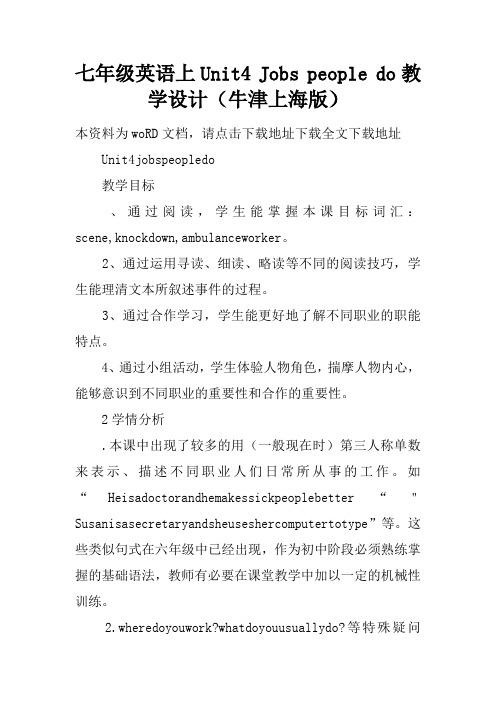
七年级英语上Unit4 Jobs people do教学设计(牛津上海版)本资料为woRD文档,请点击下载地址下载全文下载地址Unit4jobspeopledo教学目标、通过阅读,学生能掌握本课目标词汇:scene,knockdown,ambulanceworker。
2、通过运用寻读、细读、略读等不同的阅读技巧,学生能理清文本所叙述事件的过程。
3、通过合作学习,学生能更好地了解不同职业的职能特点。
4、通过小组活动,学生体验人物角色,揣摩人物内心,能够意识到不同职业的重要性和合作的重要性。
2学情分析.本课中出现了较多的用(一般现在时)第三人称单数来表示、描述不同职业人们日常所从事的工作。
如“Heisadoctorandhemakessickpeoplebetter“"Susanisasecretaryandsheuseshercomputertotype”等。
这些类似句式在六年级中已经出现,作为初中阶段必须熟练掌握的基础语法,教师有必要在课堂教学中加以一定的机械性训练。
2.wheredoyouwork?whatdoyouusuallydo?等特殊疑问句式在课文中出现用来引导学生对职业内涵的进一步阐述。
3重点难点学习重点:、了解不同职业的工作职责2、理清事件发展的逻辑顺序3、感悟各种职业的重要性以及体验分工合作的重要性学习难点:、准确使用一般过去时描述过去发生的行为2、运用合适的阅读技能4教学过程【导入】Pre-reading activity)watchavideoclipandhaveafriendlytalkaboutit.2)Talkaboutthepictureoftheaccident.通过欣赏一首jobssong,激发学生兴趣并引出主题。
对事故图片进行简单讨论,教授课文目标词汇:knockdown,scene。
【讲授】The accident)Scanthefirstparagraphtofillinthetable.2)Listentoaphonecallandmakeanewonetoreporttheaccide nt.通过寻读,填表格,了解事件发生起因;并通过打报警电话,在真实的语境中对事故有更好的了解。
牛津上海版七年级上Unit4 Period1教案(英语教案)
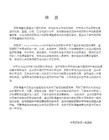
Ability aims:Further the students’ ability in expressing the food they would like.
Teaching points:1. Identify details that support a main idea.
To get students to participate in class
Look and learn
Learn the text
To get Ss familiar with the sentence patterns.
Listen and read.
Read after the recording.
To arouse Ss’ interestand lead in the topic.
While-task
Think and talk
What job do you do?
o you like your job? Why or why not?
Ask and answer questions
Students’ activities
Purposes
Pre-task
Look, think and say
ShowSssome pictures about jobs. Look at the pictures and try to think what jobs they do.
(secretary, reporter, baker, singer, pilot, postman, shop assistant, fireman)
牛津上海版英语七年级上Unit4 Jobs people do教案

牛津上海版英语七年级上Unit4 Jobspeople do教案In Unit 1.Jobs People Do。
there are several ___。
The use of the third person singular in the present simple tense to describe what people do in their daily work ___ in this unit。
For instance。
"He is a doctor and he makes sick people better" and "Susan is a secretary and she uses her computer to type." These structures are fundamental grammar rules that students should master in their middle school years。
Therefore。
teachers ___.nally。
this unit introduces a wide range of job titles and the uniforms associated with them。
Flash ns can be designed to train students to match different ___。
special interrogative structures such as "Where do you work?" and "What do you usually do?" are used in the text to guide students in understanding the job ns.At the end of this unit。
牛津上海版英语七年级上册《Unit4Jobspeopledo》说课稿3
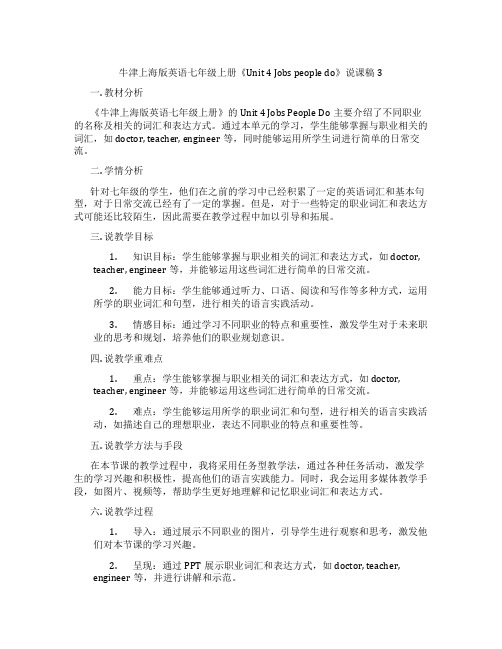
牛津上海版英语七年级上册《Unit 4 Jobs people do》说课稿3一. 教材分析《牛津上海版英语七年级上册》的Unit 4 Jobs People Do主要介绍了不同职业的名称及相关的词汇和表达方式。
通过本单元的学习,学生能够掌握与职业相关的词汇,如doctor, teacher, engineer等,同时能够运用所学生词进行简单的日常交流。
二. 学情分析针对七年级的学生,他们在之前的学习中已经积累了一定的英语词汇和基本句型,对于日常交流已经有了一定的掌握。
但是,对于一些特定的职业词汇和表达方式可能还比较陌生,因此需要在教学过程中加以引导和拓展。
三. 说教学目标1.知识目标:学生能够掌握与职业相关的词汇和表达方式,如doctor,teacher, engineer等,并能够运用这些词汇进行简单的日常交流。
2.能力目标:学生能够通过听力、口语、阅读和写作等多种方式,运用所学的职业词汇和句型,进行相关的语言实践活动。
3.情感目标:通过学习不同职业的特点和重要性,激发学生对于未来职业的思考和规划,培养他们的职业规划意识。
四. 说教学重难点1.重点:学生能够掌握与职业相关的词汇和表达方式,如doctor,teacher, engineer等,并能够运用这些词汇进行简单的日常交流。
2.难点:学生能够运用所学的职业词汇和句型,进行相关的语言实践活动,如描述自己的理想职业,表达不同职业的特点和重要性等。
五. 说教学方法与手段在本节课的教学过程中,我将采用任务型教学法,通过各种任务活动,激发学生的学习兴趣和积极性,提高他们的语言实践能力。
同时,我会运用多媒体教学手段,如图片、视频等,帮助学生更好地理解和记忆职业词汇和表达方式。
六. 说教学过程1.导入:通过展示不同职业的图片,引导学生进行观察和思考,激发他们对本节课的学习兴趣。
2.呈现:通过PPT展示职业词汇和表达方式,如doctor, teacher,engineer等,并进行讲解和示范。
牛津上海版英语七年级上册《Unit 4 Jobs people do》教学设计3

牛津上海版英语七年级上册《Unit 4 Jobs people do》教学设计3一. 教材分析《牛津上海版英语七年级上册》Unit 4 Jobs people do主要讨论人们的工作。
本单元包括一个单词列表,关于不同职业的词汇,以及一个关于职业梦想的对话。
通过本单元的学习,学生将能够理解不同职业的名称,描述自己和他人喜欢的职业,以及表达自己对未来职业的期望。
二. 学情分析七年级的学生已经具备了一定的英语基础,能够进行简单的日常交流。
但是,对于一些特定的职业名称和描述职业特点的词汇,他们可能还比较陌生。
因此,在教学过程中,需要注重词汇的讲解和操练,以及帮助学生运用目标语言进行实际交流。
三. 教学目标1.能够听懂、会说、会读、会写本单元的生词和重点句子。
2.能够描述自己和他人喜欢的职业,并表达对未来职业的期望。
3.能够运用目标语言进行简单的职业交流。
四. 教学重难点1.重点:本单元的生词和重点句子。
2.难点:特定职业名称的准确理解和运用,以及描述职业特点的词汇的运用。
五. 教学方法采用任务型教学法,通过各种互动活动,让学生在实际交流中掌握目标语言。
同时,运用分组合作、角色扮演等教学方法,增加学生的参与度和积极性。
六. 教学准备1.准备本单元的生词卡片。
2.准备与职业相关的图片或视频。
3.准备角色扮演的道具和背景。
七. 教学过程1.导入(5分钟)通过展示不同职业的图片或视频,引导学生谈论他们所知道的不同职业。
教师可以用问题引导学生进行思考,例如:“What jobs do you know?”、“What jobs do you think are interesting?”等。
2.呈现(10分钟)教师展示本单元的生词卡片,引导学生逐个学习和朗读。
同时,教师可以用简单的句子解释每个职业的特点,例如:“A teacher is a person who teaches students.”等。
3.操练(10分钟)学生分成小组,用所学的词汇和句子进行职业介绍。
牛津上海版英语七年级上册《Unit 4 Jobs people do》教学设计5

牛津上海版英语七年级上册《Unit 4 Jobs people do》教学设计5一. 教材分析牛津上海版英语七年级上册《Unit 4 Jobs people do》主要讨论人们从事的不同职业。
本单元通过介绍各种职业,使学生能够理解并运用相关词汇和句型,描述不同职业的特点和人们的职业选择。
教材内容丰富,贴近学生生活,有助于激发学生的学习兴趣,提高他们的英语水平。
二. 学情分析七年级的学生已经掌握了基本的英语语法和词汇,具备一定的听说读写能力。
他们对新鲜事物充满好奇,善于模仿和探究。
然而,部分学生可能在开口说英语方面存在恐惧心理,需要教师多给予鼓励和机会。
此外,学生对于不同职业的认识和理解程度不一,教师应充分考虑这一因素,在教学中引导学生互相分享和交流。
三. 教学目标1.知识目标:学生能够掌握本单元的重点词汇和句型,正确运用它们描述不同职业的特点和人们的职业选择。
2.能力目标:学生能够在日常生活中运用英语进行简单的职业交流,提高他们的听说读写能力。
3.情感目标:通过学习,学生能够认识到各种职业的重要性,尊重他人的职业选择,培养良好的职业观念。
四. 教学重难点1.重点:本单元的重点词汇和句型,如:doctor, teacher, police officer等职业词汇以及描述职业特点的句型。
2.难点:如何运用所学知识进行实际职业交流,以及如何正确表达自己的职业观念。
五. 教学方法1.任务型教学法:通过设计各种任务,让学生在实践中运用英语,提高他们的语言能力。
2.情境教学法:创设真实的生活情境,让学生在情境中学习英语,增强学习兴趣。
3.合作学习法:鼓励学生互相合作,共同完成学习任务,培养团队精神。
六. 教学准备1.教师准备:提前熟悉教材内容,了解学生的学习状况,设计合理的教学方案。
2.学生准备:预习本单元内容,了解相关职业知识,准备进行课堂交流。
七. 教学过程1.导入(5分钟)教师通过提问方式引导学生谈论他们熟悉的职业,如:What jobs do your parents do? 让学生自由回答,从而激发学生的学习兴趣。
牛津上海版七年级英语上册优秀教学案例:Unit4Jobspeopledo

(三)学生小组讨论
1.教师组织学生进行小组讨论,让学生分享自己父母的职业,互相交流和介绍不同职业的特点和职责。
2.教师提出问题,引导学生进行小组讨论,如"What do you think are the advantages and disadvantages of your parents' jobs?"和"How has your parents' job influenced your life?",让学生深入思考和探讨。
(二)讲授新知
1.教师引导学生学习本单元的核心词汇,如"doctor," "teacher," "nurse," "farmer," "scientist,"等,并通过例句和练习帮助学生理解和运用这些词汇。
2.教师讲解本单元的句型和语法,如"What does your mother/father do?"和"She/He is a teacher/doctor/farmer,"并通过对话练习让学生熟练掌握和运用。
(五)作业小结
1.教师布置相关的作业,让学生运用本节课所学的知识和技能,进行实际的练习和应用。
2.教师提醒学生在作业中注意运用所学的词汇和句型,并要求学生在完成作业后进行自我检查和修改。
3.教师鼓励学生在课后进行进一步的学习和探索,如通过采访家人或朋友了解更多的职业信息,拓宽自己的知识视野。
五、案例亮点
(二)问题导向
1.设计一系列问题,引导学生思考和探讨不同职业的优缺点、工作环境、发展前景等,激发学生的思考和探究欲望。
牛津上海版英语七年级上册《Unit 4 Jobs people do》教学设计4
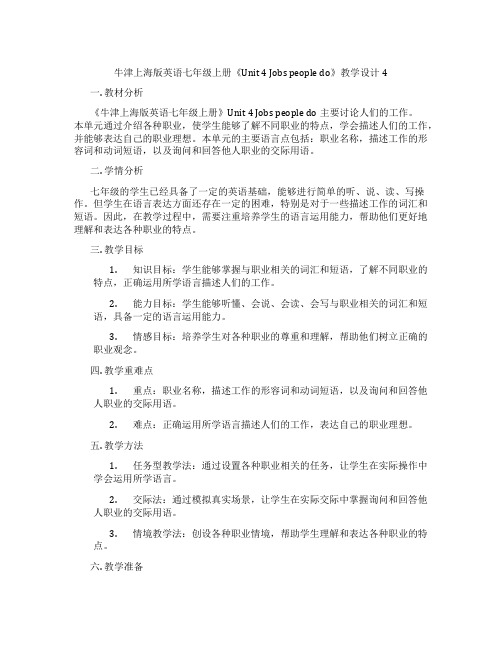
牛津上海版英语七年级上册《Unit 4 Jobs people do》教学设计4一. 教材分析《牛津上海版英语七年级上册》Unit 4 Jobs people do主要讨论人们的工作。
本单元通过介绍各种职业,使学生能够了解不同职业的特点,学会描述人们的工作,并能够表达自己的职业理想。
本单元的主要语言点包括:职业名称,描述工作的形容词和动词短语,以及询问和回答他人职业的交际用语。
二. 学情分析七年级的学生已经具备了一定的英语基础,能够进行简单的听、说、读、写操作。
但学生在语言表达方面还存在一定的困难,特别是对于一些描述工作的词汇和短语。
因此,在教学过程中,需要注重培养学生的语言运用能力,帮助他们更好地理解和表达各种职业的特点。
三. 教学目标1.知识目标:学生能够掌握与职业相关的词汇和短语,了解不同职业的特点,正确运用所学语言描述人们的工作。
2.能力目标:学生能够听懂、会说、会读、会写与职业相关的词汇和短语,具备一定的语言运用能力。
3.情感目标:培养学生对各种职业的尊重和理解,帮助他们树立正确的职业观念。
四. 教学重难点1.重点:职业名称,描述工作的形容词和动词短语,以及询问和回答他人职业的交际用语。
2.难点:正确运用所学语言描述人们的工作,表达自己的职业理想。
五. 教学方法1.任务型教学法:通过设置各种职业相关的任务,让学生在实际操作中学会运用所学语言。
2.交际法:通过模拟真实场景,让学生在实际交际中掌握询问和回答他人职业的交际用语。
3.情境教学法:创设各种职业情境,帮助学生理解和表达各种职业的特点。
六. 教学准备1.教师准备:备好相关职业的图片、视频等教学资源,设计好各种教学活动。
2.学生准备:预习本单元的生词和短语,了解一些基本的职业名称。
七. 教学过程1.导入(5分钟)利用图片或视频展示各种职业场景,引导学生谈论自己或他人的职业,激发学生对本单元的兴趣。
2.呈现(10分钟)教师展示本单元的生词和短语,让学生跟读,解释这些词汇和短语的含义,引导学生理解各种职业的特点。
牛津上海版英语七年级上Unit4 Jobs people do教案
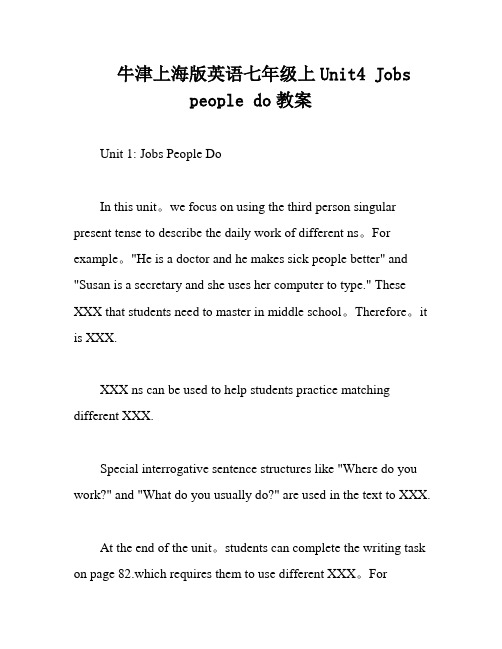
牛津上海版英语七年级上Unit4 Jobspeople do教案Unit 1: Jobs People DoIn this unit。
we focus on using the third person singular present tense to describe the daily work of different ns。
For example。
"He is a doctor and he makes sick people better" and "Susan is a secretary and she uses her computer to type." These XXX that students need to master in middle school。
Therefore。
it is XXX.XXX ns can be used to help students practice matching different XXX.Special interrogative sentence structures like "Where do you work?" and "What do you usually do?" are used in the text to XXX.At the end of the unit。
students can complete the writing task on page 82.which requires them to use different XXX。
Forexample。
"Henry is a mechanic and he works in a garage" and "David is a removal man and he works for a removal company."Students are also encouraged to use the present simple XXX should emphasize the use of the third person singular present tense。
牛津上海版英语七年级上册《Unit4Jobspeopledo》说课稿5

牛津上海版英语七年级上册《Unit 4 Jobs people do》说课稿5一. 教材分析《Unit 4 Jobs people do》是牛津上海版英语七年级上册的一单元,本单元主要讨论人们的工作。
教材通过不同职业的介绍,让学生们了解到各种工作的内容和特点,同时培养他们的听说读写技能。
本单元的话题贴近学生的生活,能够激发他们的学习兴趣,提高他们的学习积极性。
二. 学情分析七年级的学生已经掌握了一定的英语基础知识,具备一定的听说读写能力。
但学生在语言表达方面还存在一定的问题,如词汇量不足,语法运用不准确等。
此外,学生的学习兴趣和积极性对他们的学习效果有很大影响。
因此,在教学过程中,教师需要关注学生的个体差异,充分调动他们的学习积极性。
三. 说教学目标1.知识目标:让学生掌握与职业相关的词汇和表达方式,如doctor,teacher, engineer等。
2.技能目标:培养学生听说读写的能力,使他们能够运用所学知识进行日常交流。
3.情感目标:培养学生对各种职业的尊重和理解,提高他们的职业规划意识。
四. 说教学重难点1.重点:让学生掌握与职业相关的词汇和表达方式。
2.难点:引导学生运用所学知识进行实际交流,提高他们的语言运用能力。
五. 说教学方法与手段1.交际法:通过模拟真实场景,让学生在实际交流中运用所学知识。
2.任务型教学法:通过完成不同任务,培养学生听说读写的能力。
3.多媒体辅助教学:利用多媒体课件和视频,提高学生的学习兴趣。
六. 说教学过程1.导入:教师通过展示不同职业的图片,引导学生谈论各自父母或亲戚的职业,激发学生的学习兴趣。
2.新课呈现:教师介绍本节课的主要内容,让学生听录音,模仿发音,学习新词汇。
3.课堂活动:教师学生进行小组讨论,让他们用所学词汇和表达方式介绍自己的理想职业。
4.巩固练习:教师设计不同难度的练习题,让学生进行听力、口语、阅读和写作的训练。
5.课堂小结:教师对本节课的内容进行总结,强调重点词汇和表达方式。
牛津上海版英语七年级上册《Unit 4 Jobs people do》教学设计6

牛津上海版英语七年级上册《Unit 4 Jobs people do》教学设计6一. 教材分析牛津上海版英语七年级上册《Unit 4 Jobs people do》主要介绍了不同职业的特点和人们对于不同职业的看法。
通过本单元的学习,学生能够掌握与职业相关的词汇和表达方式,并能够运用所学知识进行简单的交流和描述。
本单元包括两个语篇,分别是“What do you want to be when you grow up?”和“I want to be an actor”。
二. 学情分析七年级的学生已经具备了一定的英语基础,能够进行简单的听、说、读、写操作。
然而,对于一些特定的职业词汇和表达方式可能还不够熟悉。
因此,在教学过程中,需要注重词汇的引入和操练,同时激发学生的兴趣,让他们能够主动参与课堂活动。
三. 教学目标1.知识目标:学生能够掌握与职业相关的词汇和表达方式,理解语篇的内容,并能够进行简单的交流和描述。
2.能力目标:学生能够通过听、说、读、写的方式,运用所学知识进行实际的交流和表达。
3.情感目标:学生能够对不同的职业有更全面的了解,培养对各种职业的尊重和认识。
四. 教学重难点1.重点:职业词汇的掌握和运用,语篇内容的理解。
2.难点:对于一些特定职业的表达方式,如何运用所学知识进行实际的交流。
五. 教学方法1.任务型教学法:通过设计各种任务,让学生在实际的语言环境中进行听、说、读、写的操作,提高他们的语言运用能力。
2.情境教学法:创设各种职业情境,让学生在情境中感受和理解职业词汇和表达方式。
3.小组合作学习:通过小组讨论和合作,培养学生的团队协作能力,提高他们的语言交流能力。
六. 教学准备1.教师准备:准备好语篇材料,制作相关的教学课件和教具。
2.学生准备:学生提前预习语篇,了解基本的职业词汇。
七. 教学过程1.导入(5分钟)通过向学生展示一些职业图片,引导学生谈论自己或家人的职业,激发学生的兴趣和话题。
上海新版牛津7A Unit Four Jobs people do

Unit Four Jobs people do Period 1No 16Page 27-28 People‟s jobsKnowledge aims: 1) vocabulary: the same block of flats as…; work in ahospital;make sick people better; work for…; type letters; at work;2) Grammar: simple present tenseAbility aims: To improve the ability of listening ,speaking, reading andwriting.Humane aims: Cultivate team spirit.Important Points: Grammar: simple present tenseDifficult Points: Grammar: simple present tenseTeaching methods: Teaching as a whole, visual and situational method,and team cooperationTeaching time: 1 periodLearning procedures:1) Discuss and ask . Look at the pictures and tell what his/herjob is and what he/she does2) Listen and fill in the blanks3) Read and write Read, match and write4) Look , listen and match : jobs and uniformsTeach and practice Exercises:Say what they usually do.a doctor____________________________; ateacher____________________________a pilot______________________________; a nurse____________________________a fisherman__________________________; afarmer____________________________a policeman__________________________; a busdriver_________________________a secretary___________________________; anastronaut_________________________a fireman____________________________; acook_____________________________an architect__________________________; a removalman______________________Show and evaluateBlackboard design:a doctor____________________________; ateacher____________________________a pilot______________________________; a nurse____________________________......Reflection:Unit Four Jobs people do Period 2No 17Page 27-28 People‟s jobsKnowledge aims: 1) vocabulary: the same block of flats as…; work in ahospital;make sick people better; work for…; type letters; at work;2) Grammar: simple present tenseAbility aims: To improve the ability of listening ,speaking, reading andwriting.Humane aims: Cultivate team spirit.Important Points: Grammar: simple present tenseDifficult Points: Grammar: simple present tenseTeaching methods: Teaching as a whole, visual and situational method, andteam cooperationTeaching time: 1 periodLearning procedures1) Read and write Look at the pictures and tell what his/herjob is and what he/she does2) Teach and practice ExercisesChoose the right word to complete the sentence:1) A doctor‟s job is to make ___________ ( sick, ill ) people better.2) He sometimes wears _________ ( a, an ) uniform.3) May I ask you some questions about your __________ ( work, job )?4) Susan works in an office. She types letters _________( on, in ) acomputer.5)She was afraid and she went __________ ( away, out )Rewrite the sentences as required:1), My aunt sells flowers in her flower shop. ( 划线提问)_________ _________ your aunt ____________?2) She uses her computer to type letters. ( 意思相同)She uses her computer_______ _________ letters.3) Henry is a singer. ( 划线提问) ________ ________ Henry do?4) My cousin looks beautiful. ( 同上) ________ does your cousin look___________?5), My father is a doctor. (意思相同) My father ________ _________ a doctor.Show and evaluateBlackboard design1) A doctor‟s job is to make ___________ ( sick, ill ) people better.2) He sometimes wears _________ ( a, an ) uniform…….ReflectionUnit Four Jobs people do Period 3No 18Page29-30Knowledge aims: 1) vocabulary: in the lift; answer the phone; go to meetings; take notes;wear a uniform; enjoy doing sth.2) Grammar: Wh- questions Y es/ No questionsAbility aims: To improve the ability of listening , speaking, reading and writing.Humane aims: Cultivate team spirit.Important Points: Wh- questions Y es/ No questionsDifficult Points: Wh- questions Y es/ No questionsTeaching methods: Teaching as a whole, visual and situational method,and team cooperationTeaching time: 1 periodLearning Procedure:1) Read and write Revision2) Play a game3) Discuss and ask Listen and answer the questions4) Help Kitty complete her report about Susan5) A survey ,write a report.Teach and practice Exercises:1. Fill in the blanks with the given words in their proper forms.1) The tall man over there sings well. He is a famous ____________ ( sing )2) She is one of the best ______________ ( act ) in the world.3) There are about 6 ______________ ( policeman ) in the station.4) Street ___________ ( clean ) start work early in the morning every day.5)Please go to the nearest ___________ ( baker ) and buy some bread.6) He is the ____________ ( manage ) of this company.2. Rewrite the sentences as required:1), Susan works in an office in the city centre. 划线提问)__________ __________ Susan work?2) People do different jobs in Ben and Kitty ‘s block. ( 一般疑问句)_________ people _________ different jobs in Ben and Kitty …s block?3) Jane has her breakfast on her way to school. (同上)___________ Jane ________ her breakfast on her way to school?4) He often tells us funny stories.( 否定句) He ________ often _______ us funny stories.5) The film is very exciting. (感叹句) _______ _______ the film is !________ ________ ________ film !3. Put the following sentences into English1) 救护人员快速把病人开车送去医院。
牛津上海版七年级上英语Unit4 Period1教案

Ability aims:Further the students’ability in expressingthefood they would like.
Teachingpoints:1. Identify details that support a main idea.
Summary
Identify the difference jobs and what they do.
To help Ss consolidate what they have learned in this period
Assignment
1.Learn the vocabularies by heart.
七年级英语上册教案
Unit4Jobs people do
Period One
Teaching Plan
Type:Read, match ad write
Designing ideas:Task-based andlearner-centered
Teaching aims:1. Use nouns toidentifypeople
To arouse Ss’ interestand lead in the topic.
While-task
Think and talk
What job do lly do?
Do you like your job?Why or why not?
Ask and answer questions
2.Do workbook.
Reporterfiremanpostman banker
七年级秋季班-第8讲Unit 4 Jobs people do1教案

Unit 4 Jobs people doB: A travel agency.A: 3 Have you traveled a lot?B: Yes, I have been to a few places.A: Have you been to Europe?B: 4 There's nothing I like more than traveling. What about you?A: Oh, I really want to take a trip to Paris.B: There are lots of historical places of interest there. 5A: Thanks a lot.B: Not at all. 6A: As soon as I can find a place to live. I like this beautiful town.B.TrueorFalse(判断下列句子是否符合短文内容,符合的用“T”表示,不符合的用“F”表示)We are all busy talking about and using the Internet (互联网), but how many of us know the history of the Internet?Many people are surprised when they find that the Internet was set up in the 1960s. At that time, computers were large and expensive. Computer networks (网络) didn't work well. If one computer in the network broke down, then the whole network stopped. So a new network system had to be set up. It should be good enough to be used by many different computers. If part of the network was not working, information could be sent through another part. In this way computer network system would keep on working all the time.At first the Internet was only used by the government, but, in the early 1970s, universities, hospitals and banks were allowed to use it too. However, computers were still very expensive and the Internet was difficult to use. By the start of the 1990s, computers became cheaper and easier to use. Scientists had also developed softwares that made "surfing" (浏览) the Internet more convenient.Today it is easy to get online (上网) and it is said that millions of people use the Internet every day. Sending e-mails is more and more popular among students.The Internet has now become one of the most important parts of people's life.1.The Internet has a history of less than thirty years.2.In the 1960s computer networks went wrong easily.puters become cheaper so that many hospitals and banks were allowed to use them.4.People didn't have enough software to get on-line conveniently until the early 1990s.5.Students like sending e-mail very much.C. Choose the best answer (根据短文内容,选择最恰当的答案):Mr. and Mrs. Turner live outside a small town. They have a big farm and they are always busy working on it. Their son, Peter, studied at a middle school. The young man studied hard and did well in his lessons. It made them happy.Last month Peter finished middle school and passed the entrance examination (升学考试). Mrs. Turner was very happy and told the farmers about it.Yesterday morning the woman went to the town to buy something for her son. On the bus she told one of her friends how clever and able her son was. She spoke very loudly. All the people inthe bus began to listen to her."Which university (大学) will your son study in?" a woman next to her asked."In the most famous university in our country!" Mrs. Turner said happily."The most famous university?""Oxford University (牛津)"Most of the passengers(乘客) looked at her carefully. Some of them said to her, "Congratulations!"A woman said, "I'm sure he'll know Fred Smith.""Who's Fred Smith?""He's my son.""Does he study in the university, too?""No," said the woman. "He is one of the professors."1.The story happened in ____________ .A. AmericaB. FranceC. GermanyD. England2. Mr. and Mrs. Turner were happy because _______________ .A. their son did well in his lessonsB. they have a big farmC. they have a good harvestD. their son studied at a middle school3. Mrs. Turner wanted everyone to know ______________ .A. her son finished middle schoolB. her son was handsomeC. her son was going to study in a universityD. her son was very friendly to others4. Mrs. Turner spoke so loudly in the bus that _________________ .A. her friend could hear herB. all the people could hear herC. she hoped to make all the people happyD. she hoped they would say congratulations to her5. Which of the following is true?A. The woman wasn't interested in Mrs. Turner's words.B. Mrs. Turner knew nothing about the famous universityC. The woman wanted to stop Mrs. Turner from showing off (炫耀).D. The woman next to Mrs. Turner wanted to show off her son, too.D. Read the passage and answer the following questions (根据短文内容,回答下列问题);If you go to visit London, you'll see a lot of buses and cars on the road. You'll also see a lot of bikes because more and more people travel by bike.There are a lot of reasons for this. First, it is very cheap to buy a bike, and it's quick too. You often have to wait for a bus for half an hour. When the bus comes, there are so many other buses and cars on the roads that the bus moves very slowly.I traveled to work by bus for about four years. I often arrived at work late and tired. Then one day, about two years ago, a friend of mine said, "I go to work by bike. Why don't we travel together?""Because my bike is old," I answered, "and there are so many buses and cars on the roads. I'll feel frightened ...""You needn't feel frightened!" said my friend. "If you follow me and ride slowly, you'll be fine."The next day I bought myself a new bike. Although we went slowly, we arrived at work quickly. It took 40 minutes to go by bus, but only half an hour by bike.Now I don't feel afraid. I love going to work by bike. I take a different road every day. I arrived at work quickly, and moreMy dream in the futureI want to be a teacher in the future. When I was young, many good teachers not only taught me how to study but also taught me how to be a kind man. We should show our sense of responsibility. So I am always ready for helping others. I am learning more knowledge, doing much exercise to keep healthy. I think I'll be a good teacher just as my teachers.Step 6: Summary.What did you learn today?Could you tell me something about our lessons?Please let me know your opinions about it and I will do my best to perfect it .Thanks!Step 7: Homework.I. Read and choose the best answer.( ) 1. We need to buy two ___________ for our new flat.A. furnituresB. piece of furnitureC. furnitureD. pieces of furniture( ) 2. This kind of material ______________ easily, so don't smoke here.A. catches fireB. on fireC. gets fireD. brings fire( )3. My father is a wonderful _______________ in our town.A. cooksB. cookerC. cookingD. cook( )4. The box is very heavy, so we'd_______________ better carry it downstairs .A. by liftB. on liftC. in liftD. with lift( )5. L isa _______________ Tom want to be engineers in the future.A. Both; andB. Neither; norC. Both; orD. Either; or( )6. My job is to ________________ the telephone at night.A. receiveB. answerC. acceptD.get( )7. It takes the policeman two hours to_______________the big fire.A. be outB. be upC. put outD. put up( ) 8. After several months' hard work, the scientists_______________the pandas successfully.A. rescuedB. has rescuedC. are rescuingD. have been rescued【Keys】1-5 DADAA 6-8 BCAII. Rewrite the sentences as required.1.This room is as big as that one. (保持句意不变)This room is the______________as_____________ that one.2. I want to be a teacher because I love children very much. (对划线部分提问)______________ ______________ you want to be a teacher?3. My job is quite interesting. (对划线部分提问)_____________ _____________ your job?4. I plan to buy a pair of sports shoes for my son. (对划线部分提问)_____________ do you plan to buy for your son?5. Jackson put the newspaper on the table just now. (改为一般疑问句)______________ Jackson _____________ the newspaper on the table just now?【Keys】1. same size 2. Why do 3. How is 4. W hat 5. Did; putⅢ. Read the passage and judge if the sentences are TRUE or FALSE.Most people have jobs. They go to work nearly every day. Some people are lucky. Either they have very interesting jobs or they make a lot of money. Most people are not so lucky. Either their jobs are not very interesting or they don't make much money.The most interesting jobs are often the most difficult. People take a long time to learn how to do them. Doctors study for at least six years after finishing school. Some young people have interesting and high-pay jobs. Many young players do their work successfully. Football and tennis stars are usually under 35 years old. Older people usually cannot play these sports very well. They cannot move fast enough. Golf, however, is a good sport for older people. Many golf players are quite old, but they can play it successfully.Most people work until they are 60 or 65 years old. Then they retire and have a lot of free time. Some people never retire though. These people usually have very interesting jobs. Writers, artists, scientists and actors usually work until they die. Their work is their life.( )1. Most people don't go to work every day.( )2. Some people are lucky because they can find an interesting job and make lots of money.( )3. People have to take a long time to learn the difficult job.( )4. Older people usually still play football and tennis very well.( )5. All people get retired when they are 60 or 65 years old.【Keys】1-5 FTTFFⅣ. Read the passage and choose the best answer.When we ask students what they want to be, they often talk about usual jobs, things like teachers and doctors. But if you think about it, many people don't plan to do their jobs. They just start doing them by accident. We will talk about two people with unusual jobs.Emily is a dentist but she doesn't work with people. She works with horses. After university she took care of animals' health for several years, but she noticed that there were few people who could help horses' teeth. She decided to go to college and study again. Then she had to buy special tools, but she is never out of work. She'd always be very busy taking care of horses' teeth. "I couldn't be a dentist for people now," Emily said, " because I really enjoy working with horses. "As soon as David could read, he read books about robots, but the robots he builds today don't look like the strange robots people built in his books. He built robots for industry. Early one moming he made up his mind to study math, science and computers so that he could break into the world of robot engineering. " Some of the math is very difficult," said David, "but you must study math to be an engineer. " Fortunately he got top marks in all his math exams.( ) 1. Many people start doing their jobs_______________.A. on purposeB. by chanceC. when they've graduatedD. i ntentionally( )2. Emily doesn't want to be a dentist because_______________.A. the pay is lowB. she has to buy special toolsC. she will be out of workD. she likes working with horses( )3. To become a robot engineer, David______________ .A. needed to worryB. bought a lot of robotsC. had to study hardD. didn't have to go to college( )4. David got top marks in all his math exams, although______________.A. math was not easy to studyB. he had to study math to be an engineerC. he could break into the world of robot engineeringD. he made up his mind to study math, science and computers( )5. Which of the following is NOT right in the passage?A. Students often talk about usual jobs like teachers and doctors.B. Emily likes horses very much.C. David built robots for industry.D. David isn't good at maths.【Keys】1-5 BDCADⅤ. Read the passage and fill in the blanks with proper words.Tom was driving home from the station in his car yesterday evening when he had an a 1 .He was driving a 2 a main road at 50 kilometers an hour when a 3 car came out of a side road and hit his. There was a lot of damage to both cars, and both Tom and the other man, Mr Brown, were h 4 . One of Tom's arms was b 5 , and Mr Brown had a bad cut on his head.Another car was f 6 Tom's. It stopped quickly and a man and a woman got out of it. They ran to the damaged cars and pulled Tom and Mr Brown out of their cars because they thought, "Perhaps the gas in those cars will c 7 fire and burn the two men. "The man and the woman t 8 a doctor and the police. Soon a car a 9 and took the two men to hospital. Two policemen also arrived and began to measure things. F 10 , a truck came and pulled the two cars off the road.1. ___________2. __________3. ____________4.____________5._____________。
上海版牛津英语七年级第一学期 7AModule1Unit4教案设计(5课时)

Module 2 My neighbourhoodUnit 4 Jobs people doTasks in this unit:Talking about people’s jobs: where people work and what they do; talking about work routines; doing a survey of people’s job and writing a report; reading about an accident and the people who help; compiling a page of common jobs and illustrating them. Language focus:Using nouns to identify peoplee.g., Mrs Wang is a doctor.Using the simple present tense to talk about habitual actionse.g., She works in a hospital.Language skills:Listening:Identify details that support a main ideaSpeaking:Open an interaction by eliciting a responseReading:Read written language in meaningful chunksWriting:Gather and share information and ideas by using strategies such as brainstormingEpisode oneTeaching procedureModule 2 My neighbourhoodUnit 4 Jobs people doLanguage focusUsing the simple present tense to describe habitual actionse.g., Who wears a uniform at work?Language skillsListeningIdentify details that support a main ideaSpeakingUse appropriate intonation and stress to convey intended meanings ReadingRe-read to establish and confirm meaningsEpisode TwoTeaching procedureModule 2 My neighbourhoodUnit 4 Jobs people doLanguage focusAsking Wh-questions to find out specific informatione.g., What’s your job?Asking Wh-questions to find out placee.g., Where do you work?Using the simple present tense to describe habitual actionse.g., I answer the phone.Language skills:ListeningIdentify main ideas in a new topicSpeakingOpen and maintain an interaction by asking and answering questions ReadingIdentify details that support a main ideaWritingGather and share information and ideas by using strategies such as interviewingEpisode ThreeTeaching procedureModule 2 My neighbourhoodUnit 4 Jobs people doLanguage focusUsing the simple past tense to talk about past actionse.g., …a motorcycle came towards Ben and knocked him downUsing adjectives to describe conditionse.g., Ben had a broken arm…Language skillsListeningListen for specific informationSpeakingUse appropriate intonation and stress to convey intended meanings and feelings ReadingRead written language in meaningful chunksEpisode FourTeaching procedureModule 2 My neighbourhoodUnit 4 Jobs people doLanguage focusUsing the simple present tense to describe habitual actionse.g., He sees the street cleaners cleaning the streets.Using adverbs of timee.g., They start work early.Language skillsListeningListen for specific informationSpeakingUse appropriate intonation and stress to convey intended meaningsReadingRead written language in meaningful chunksWritingPlan and organize information and ideas by deciding on the sequence of contentEpisode FiveTeaching procedure。
- 1、下载文档前请自行甄别文档内容的完整性,平台不提供额外的编辑、内容补充、找答案等附加服务。
- 2、"仅部分预览"的文档,不可在线预览部分如存在完整性等问题,可反馈申请退款(可完整预览的文档不适用该条件!)。
- 3、如文档侵犯您的权益,请联系客服反馈,我们会尽快为您处理(人工客服工作时间:9:00-18:30)。
七年级英语上Unit4 Jobs people do教学设计(牛津上海版)
本资料为woRD文档,请点击下载地址下载全文下载地址Unit4jobspeopledo
教学目标
、通过阅读,学生能掌握本课目标词汇:scene,knockdown,ambulanceworker。
2、通过运用寻读、细读、略读等不同的阅读技巧,学生能理清文本所叙述事件的过程。
3、通过合作学习,学生能更好地了解不同职业的职能特点。
4、通过小组活动,学生体验人物角色,揣摩人物内心,能够意识到不同职业的重要性和合作的重要性。
2学情分析
.本课中出现了较多的用(一般现在时)第三人称单数来表示、描述不同职业人们日常所从事的工作。
如“Heisadoctorandhemakessickpeoplebetter“"Susanisasecretaryandsheuseshercomputertotype”等。
这些类似句式在六年级中已经出现,作为初中阶段必须熟练掌握的基础语法,教师有必要在课堂教学中加以一定的机械性训练。
2.wheredoyouwork?whatdoyouusuallydo?等特殊疑问
句式在课文中出现用来引导学生对职业内涵的进一步阐述。
3重点难点
学习重点:
、了解不同职业的工作职责
2、理清事件发展的逻辑顺序
3、感悟各种职业的重要性以及体验分工合作的重要性
学习难点:
、准确使用一般过去时描述过去发生的行为
2、运用合适的阅读技能
4教学过程
【导入】Pre-reading activity
)watchavideoclipandhaveafriendlytalkaboutit.
2)Talkaboutthepictureoftheaccident.
通过欣赏一首jobssong,激发学生兴趣并引出主题。
对事故图片进行简单讨论,教授课文目标词汇:knockdown,scene。
【讲授】The accident
)Scanthefirstparagraphtofillinthetable.
2)Listentoaphonecallandmakeanewonetoreporttheaccide nt.
通过寻读,填表格,了解事件发生起因;并通过打报警
电话,在真实的语境中对事故有更好的了解。
【讲授】Things people did to rescue Ben
)Haveashadowguessing.
2)Skimthepartonpolicemenandmedicalworkerstomatchpic tureswitheachparagraphandreorderparagraphs.
3)Scanthelastparagraphandanswerquestions.
4)FillinthetableonthethingspeopledidtorescueBenandb rainstormmorethingstheydidintheaccident.
通过shadowguessing,引起学生兴趣并了解谁在事故中提供帮助。
通过略读,将图片与文本配对并将文本排序,了解大意。
通过细读,找出关键动词,了解不同职业的具体职能。
通过头脑风暴,激发学生思维,学生思考不同职业的人是如何履行各自的职责,深化课文理解。
【讲授】while reading
I.Lookatthislady.whatjobdoesshedo?whatdoessheusuall ydo?
Lookatthisgirl.whatisshedoing?Sheisdrawingplansofbu ildings.whatjobdoesshedo?Lookatthesepeople.Theyareb
uildingwhatsheisdrawingorwecansaytheyareconstructin gbuildings.constructisaverb,anditsnounformisconstru ction.whatcompanydoessheworkfor?
whatishedoing?orwecansayheisremovingsomething.Herer emoveisaverb,anditsnounformisremoval.whatjobdoeshed o?whatcompanydoesheworkfor?
whoisthesecretary?whoisthearchitect?whoistheremoval man?Theyliveinthesameblock,buttheyhavedifferentjobs .Hereblockmeansbuilding.
II.Nowlistentothetapeandreadtogether.Underlinetheph rase“thesame…as”.Howto
saythesentence“我和吉姆去同一所学校。
”“我和莉莉喜欢同一首歌。
”
Listen.wheredoesmrs.wangwork?whatdoessheusuallydo?U nderline
thephrase“makesickpeoplebetter”.
Listen.wheredoesmissTangwork?whatdoessheusuallydo?U
nderlinephrases“workforaconstructioncompany”and “drawplansofbuildings”.
Listen.wheredoesSusanwork?whatdoessheusuallydo?Unde rlinethephrase“typeletters”.
Listen.wheredoesDavidwork?whatdoesheusuallydo?Under linephrases“Davidisaremovalman.”and“movepeople’sfurnituretotheirnewflats”.
【活动】Sharing time
ShareopinionsaboutwhoBenwasthankfultoandexplainther easons.
通过讨论事故主人公Ben最可能感谢谁,巩固一般过去时的用法并为最后的小组活动做好语言铺垫,同时培养学生的辩证思维。
【活动】Live interview
workingroupsoffourandhavealiveinterview.
通过小组活动,学生体验人物角色,揣摩人物内心,意识到不同职业的重要性以及合作的必要性。
【作业】Assignment
)RetellthestoryinSs'ownwords.
2)writeatleast4sentencesaboutSs'thinkingonBen’saccident.
通过复述课文,巩固课文内容与一般过去时的用法。
并通过谈一谈对这起事故的想法,将学习延伸到课外。
【活动】Post-reading
Let’scompletethetable.whomovesfurniture?whatjobdoesDavi ddo?
I.Inpairs,writeabouttwodifferentjobs.Thenreadalouda ndaskotherstudentstoguess.
youcanwritelikethis “Sheworksinahospital.Shemakessickpeoplebetter.what jobdesshe/hedo?”
【练习】consolidation
workbook7Apages23
【作业】homework
I.Foryourhomework,pleasefinishwBpage22,
copythenewwordsandrecitethetext.。
